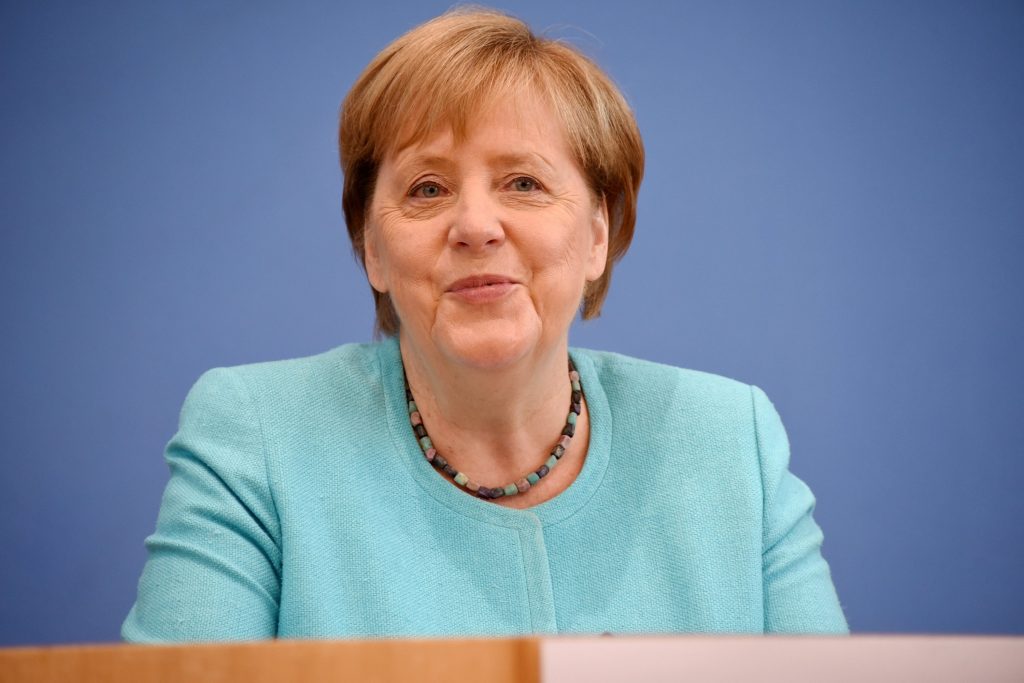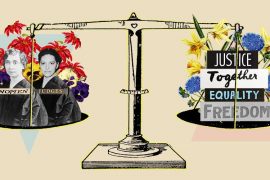By Walcott Aganu
We criticize more than praise. Fiery or flowery rhetoric cannot disguise the fact that most politicians have not delivered what they promised. Hence, we should praise those leaders who look dull but have performed spectacularly, especially when it is a woman.
Germans will not forget the towering legacy of Angela Merkel in a hurry. The Germans elected her to lead them, and she led 80 million Germans for 16 years with competence, skill, dedication and sincerity. She did not utter nonsense. She did not appear in the alleys of Berlin to be photographed. She has been dubbed “The Lady of the World”, described as the equivalent of six million men.
Trained as a quantum chemist, Merkel spent her first 35 years living in Soviet-controlled East Germany, working at a state-run research centre until the fall of the Berlin Wall in 1989. That historic shift prompted Merkel to abandon scientific work and embrace a lifelong interest in politics, steadily ascending the ranks of a newly unified German government.
Elected chancellor in 2005, Merkel is the first woman and the first East German to hold her nation’s highest elective office. When she steps down in 2021, she will be Germany’s second-longest-serving leader of the modern era, after her former mentor, Helmut Kohl, who spoke at Harvard’s Commencement in 1990.
After 16 years as German chancellor, Angela Merkel leaves behind a vast legacy. It bears her name, Merkel. The word captures the nuanced, complex and contradictory nature of her legacy. It is her. It is politics. It is life.
Merkel’s cautious, consensual, incremental decision-making is so distinctive that it became a verb. Merkel implies managing Germany’s evolution in a measured manner that reassured other countries and Germans themselves, calmly steadying the European Union in turbulent times. “This is her greatest legacy,” said foreign policy expert Daniel Hamilton. When she attended her 107th—and possibly last—EU summit in Brussels in October, European Council President Charles Michel called her a monument. “A summit meeting without you will be like Rome without the Vatican or Paris without the Eiffel Tower,” he said.
From the “girl” to “Mutti” and “world most trusted leader”
Merkel, the “girl” who grew up behind the Iron Curtain in impoverished East Germany, has transformed into “Mutti”—the mother of the unified German fatherland. She took her conservative, right-wing Christian Democratic Union to the centre, expanded Germany’s political and economic power in Europe and became the EU’s biggest defender. According to a Pew poll, the 67-year-old Merkel is the world’s most trusted leader. For 10 years, Forbes magazine has ranked her the world’s most powerful woman. She is the longest-serving head of state in the democratic world. Dismayed by their leader, American commentators began calling her “the leader of the free world” during the Donald Trump presidency (a title that made her cringe as much as when a Barbie doll was named after her!)
Former US President Barack Obama told Merkel that the entire world owed her a debt of gratitude for taking the high ground for so many years. Merkel is the solid, sensible, ethical woman of gravitas who counterbalanced the braggadocio of the mighty men of global politics like Trump, Russian President Vladimir Putin and Chinese President Xi Jinping. She tactfully and pragmatically balanced great power rivalries. Her fact-based, understated, unrhetorical style sharply contrasted with leaders such as Trump, who relentlessly baited the EU, Germany and her. Obama had urged her to run for a fourth term because of the risk to Europe from Trump.
Merkel refused to get sucked into breathless news cycles, patiently consulted opposing viewpoints and gauged public mood before deciding. Her legacy includes brokering countless compromises at EU, G7 and G20 summits, steering four coalition governments at home, and working with or outmanoeuvring authoritarian leaders, allies, coalition partners and party rivals.
Steering the ship for Germany and Europe
Merkel has steered Germany and Europe out of several consecutive crises. From ensuring Germany transformed from the “sick man of Europe” to the largest economy of the prosperous continent. Opening Germany’s borders for millions of refugees who had nowhere to go and steering the course of German politics from personal attacks to policy discourses, Merkel has done it all.
Merkel will be remembered most for shifting Germany’s politics from a männerclub – a club of men – into one where policies were given quite a weight. Her expertise in diplomacy and negotiating with rivals within and outside Germany helped her become one of the most iconic figures in Europe throughout her 16-year rule.
Forbes named her the “most powerful woman in the world” for 10 years, and for a good reason. The German chancellor remains an iconic symbol of women’s representation. She supported Ursula von der Leyen, the first female German defence minister and EU Commission president.
Europe has, for the most part, depended on Merkel and her diplomatic skills. The credit to saving Europe and the European currency goes to the German chancellor, whose hallmark EU foreign policy was embedded in the iconic and oft-repeated statement: “If the euro fails, Europe fails. We can’t let that happen.”
She played an instrumental role in creating the EU’s rescue fund and debt relief and agreeing to European Central Bank’s bond-buying program.
Merkel will always be remembered for her tough stance against Greece, which at the time, many viewed as a cruel view but later came to realize that it was a principled one. She did not even rule out a “Grexit” when talks began in the 2010s to save the Eurozone. She had made no effort to hide her anger at Greece, saying in May 2011 that people in Greece and Portugal retired several years earlier than they did in Germany.
“Yes, Germany helps, but Germany only helps if the others really make an effort, and that has to be proven,” she had said in 2011.
The statement was rooted in Germany and Merkel’s adopted stance that wanted austerity measures to be introduced in Greece if it wanted international bailouts to rescue itself from a crushing debt crisis.
Another cornerstone of Merkel’s European policy was to open its borders to thousands of refugees who arrived on the country’s shores from Syria and the Balkans. While many lashed out at the German chancellor for not being cautious enough in her decision to welcome people with open arms, she confidently told opponents and supporters alike, “We can manage this.”
When critics accused Merkel of encouraging thousands of refugees to make the dangerous journey across the Mediterranean Sea to Germany, the German chancellor brushed it aside with her politically correct statement: “If we had not shown a friendly face, that’s not my country,” she said.
Stepping down in her own terms
In 2018, Merkel announced she would not seek a fifth term, exiting at a time of her choosing. Her predecessors mostly lost elections or were ousted by scandals. She has been the very antithesis of the heavy-smoking, hard-drinking, womanizing, wheeling-and-dealing, domineering big men of West German politics. Merkel is the first woman chancellor, the youngest and the first from East Germany.
In her 16 years as leader, Merkel has seen many international counterparts come and go. She has worked with eight Japanese prime ministers, seven Italian prime ministers, five UK prime ministers, and four US presidents – not to mention six changes of prime minister in Australia.
Many leaders dramatically underestimated her, judging wrongly from her early nickname of “das Mädchen” (the girl) that she might be a political neophyte. She soon proved to be a role model for reliability and responsibility and the impact of female leadership.
Merkel will enter the pantheon of the great German chancellors who shaped the course of their nation’s history—Konrad Adenauer who brought a democratic Germany into NATO and reconciled with Israel and France; Ludwig Erhard who stewarded Germany’s economic miracle; Willy Brandt who sought détente with the Soviet Union and asked forgiveness for holocaust by falling to his knees in a Warsaw ghetto and Kohl who steered the reunification of East and West Germany.
Merkel is the first German chancellor to stand down on her own terms and timeline without the political pressures known by her predecessors. Notably, she also does not have an obvious successor. Pollsters say had Merkel contested; she would have won a fifth term. Instead, candidates jostled to be her heir.
Even in her glory, she remained humbled
Throughout her political life, Merkel towered over the sleaze and scum of everyday politics. She remained a private citizen of impeccable integrity, dedication and intelligence, living in her own modest Berlin apartment as chancellor, shopping for her own groceries. Her outstanding quality is her normalcy. She consistently wore black pants, uni-colour hip-length jackets and flat shoes. Historian Jan-Werner Müller said Merkel’s anti-charisma had turned into a kind of charisma that communicated sincerity. Her anti-oratorical speaking style anaesthetized listeners, and she demobilized opponents by dulling and depoliticizing conflicts. An aspect of Merkel is being so self-restrained that it is hard to pin her down.
To understand Merkel, perhaps one must travel to her past. “I know what living in a collapsing system feels like and I don’t want to go through that again,” she told her biographer Stefan Kornelius. Daughter of a pastor, Merkel is a good girl from communist East Germany who rose by excelling in school, speaking little and trusting few. She kept her first husband’s name and married Joachim Sauer, a quantum chemist, like her. Her scientific training frames her worldview—a level-headed empiricist who is unimpressed by grand visions, histrionics and hyperbole.
Merkel is a celebrated “incrementalist’, taking small-step decisions, not huge leaps to solve complex problems, muddling, adapting, compromising, recognizing both possibilities and limitations. It is too early to judge her legacy because future events also determine legacies. If the EU falls apart, people will glorify the Merkel days. If it becomes stronger, she will be remembered as the stepping-stone.
Merkel has declined offers to chair various organizations. When she goes, she goes… literally into the wilderness, hiking on mountain trails with her husband, reading, travelling and watching football. She would “simply enjoy some leisure time knowing that no possible upheaval may happen in the next 20 minutes… a little melancholy will perhaps also come later,” said Merkel. When asked what she looked forward to most in retirement, she replied, “Not having to make decisions constantly.”
Leaders come and go. However, Merkel’s absence from power after over a decade and a half will undoubtedly prove to be a setback for the German nation that has loved to lead the EU, courtesy of its sound economic policies.





Comments are closed.